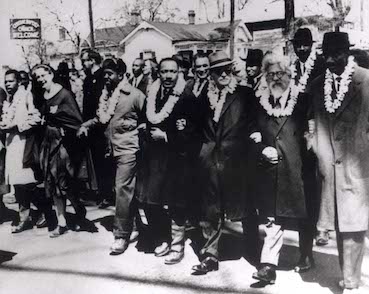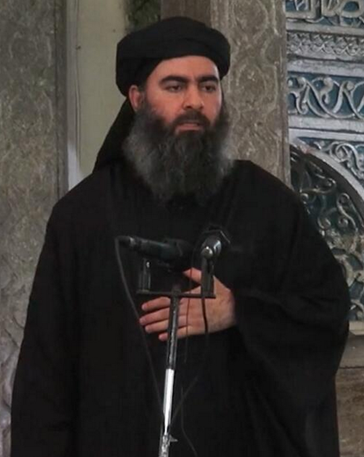You are here
by Rod Cardoza on Tue, 03/31/2015 - 15:23  Thankfully, Rabbi Heschel did not draw such simplistic conclusions. He knew that many brave Christians risked their lives to protect Jews long before allied Western forces (also comprised mostly of Christians) ultimately brought an end to Nazi terror in 1945. Heschel therefore did not avoid all Christians in the US or blame them for the horrors he suffered. Instead, he developed meaningful friendships with virtuous Christians, invited them to his home for dinner on Sabbath holidays, and even collaborated in social justice with Christian leaders like Martin Luther King Jr.
Thankfully, Rabbi Heschel did not draw such simplistic conclusions. He knew that many brave Christians risked their lives to protect Jews long before allied Western forces (also comprised mostly of Christians) ultimately brought an end to Nazi terror in 1945. Heschel therefore did not avoid all Christians in the US or blame them for the horrors he suffered. Instead, he developed meaningful friendships with virtuous Christians, invited them to his home for dinner on Sabbath holidays, and even collaborated in social justice with Christian leaders like Martin Luther King Jr.

ISIS has shocked the world with horrific acts of brutality so inhumane and “unIslamic” that even Al-Qaeda has disavowed all links with them. Last September, more than 120 prominent Muslim leaders and scholars of Islamic law from around the world sent a letter to Al-Baghdadi, chief leader of ISIS, in which they condemned many ISIS teachings and practices as “forbidden in Islam”. The letter, signed by Egypt’s Grand Mufti Sheikh Shawqi Allam (the highest official of Islamic law among Sunni Muslims in Egypt, the most populous country of the Middle East) refers to the “Islamic State” in quotation marks only. Egypt’s Grand Mufti told CNN in February that “everything ISIS does is far away from Islam. What it is doing is a crime by all means.” Dar al-Ifta, the prestigious Islamic law school that Sheikh Allam oversees, even launched a campaign asking journalists not to call ISIS an “Islamic State”, suggesting “al-Qaeda Separatists in Iraq and Syria” or QSIS instead to remove the word “Islamic” from their title.
While eminent Muslim religious leaders and Arab states are united in their condemnation of ISIS, their sophisticated recruiting efforts have attracted a growing number of young Muslims with promises of free housing, free food, and a chance to usher in the apocalypse. Given their agenda of military conquest, their policy against peace treaties, and their explicit opposition to all Muslims who support any other government, it appears they have far too many enemies to succeed in ongoing conquest. Meanwhile, how should Jews and Christians around the world respond to the crisis of ISIS?
Rabbi Abraham Joshua Heschel
Both Jews and Christians would do well to learn from the life and experience of Rabbi Abraham Joshua Heschel, one of the leading Jewish theologians and philosophers of the 20th century. Six weeks before Germans invaded Poland during World War II, Heschel escaped and travelled to the United States. Heschel’s mother was murdered by Nazis. One of his sisters was killed in a German bombing, while two other sisters died in Nazi concentration camps. Heschel never returned to Germany or Poland. He once wrote, “If I should go to Poland or Germany, every stone, every tree would remind me of contempt, hatred, murder, of children killed, of mothers burned alive, of human beings asphyxiated.”
Who committed all these heinous crimes against humanity?
Perspectives on Identity
Many would identify the perpetrators of the holocaust as Nazis. Others identify them more generically as Germans. Still others identify them as Christians. All are correct, in one way or another. Identity is a complex phenomenon, and religious identity is no exception. As a cultural anthropologist, I seek answers from different perspectives. And it is this matter of perspective that deeply affects the dynamics of identity. For example, people who share the same national and ethnic identity often differentiate between themselves politically and religiously. However, the outsider who is unfamiliar with the political or religious diversity of a country is more likely to lump everyone together into a single national identity, or maybe a single religious identity.
Census or demographic surveys generally count religious identity differently than members of a religious sect. The prior counts self-identity: Whatever religion people identify themselves as, they are (e.g., Jewish, Christian or Muslim). Religious sects, however, use criteria like observance, doctrine, or textual interpretation. For example, ISIS considers both Shi’ites and Sunnis who oppose them to be apostates guilty of bid’ah (heretical innovation). Orthodox, Catholic, Protestant and Anabaptist Christians (and other related sects) have similarly described each other as heretical or not “real Christians” for different reasons. Nonetheless, ask all these Christians to indicate their religion on a census survey using options like Buddhist, Christian, Hindu, Jewish, Muslim, Sikh, or none, and all will check “Christian”.
Who is to Blame?
When Christians are counted by demographic criteria, we can understand why some insist that holocaust perpetrators were in fact “Christians” and that Christianity is complicit in the contempt, hatred, and murder of Jews during the holocaust, especially since some Christian theologians in Germany were actively reinterpreting biblical texts to justify the Nazi agenda (as documented by Heschel’s daughter, Prof. Susannah Heschel in The Aryan Jesus: Christian Theologians and the Bible in Nazi Germany).
 Thankfully, Rabbi Heschel did not draw such simplistic conclusions. He knew that many brave Christians risked their lives to protect Jews long before allied Western forces (also comprised mostly of Christians) ultimately brought an end to Nazi terror in 1945. Heschel therefore did not avoid all Christians in the US or blame them for the horrors he suffered. Instead, he developed meaningful friendships with virtuous Christians, invited them to his home for dinner on Sabbath holidays, and even collaborated in social justice with Christian leaders like Martin Luther King Jr.
Thankfully, Rabbi Heschel did not draw such simplistic conclusions. He knew that many brave Christians risked their lives to protect Jews long before allied Western forces (also comprised mostly of Christians) ultimately brought an end to Nazi terror in 1945. Heschel therefore did not avoid all Christians in the US or blame them for the horrors he suffered. Instead, he developed meaningful friendships with virtuous Christians, invited them to his home for dinner on Sabbath holidays, and even collaborated in social justice with Christian leaders like Martin Luther King Jr.Jewish and Christian Response
Heschel’s response is instructive for Jewish and Christian response to ISIS. Rather than stereotype all Muslims according to the atrocities of one extremist group who clearly broke from the Muslim mainstream in their interpretation of sacred texts, Jews and Christians need not avoid all Muslims, but should instead build friendships with virtuous members of the Muslim community, invite them into their homes for dinner, and collaborate with them in compassionate service.
As the director of Abrahamic Alliance International, an organization commited to uniting Jews, Christians and Muslims for active peacebuilding and poverty relief, I have seen hundreds of Jews, Christians and Muslims unite in compassionate community service to show each other and a watching world that peaceful coexistence is not a naïve and distant dream, but a growing and present reality. Even as strident “Christian” opposition to the Civil Rights movement did not deter collaboration between Heschel and King, so too the actions of violent “Muslim” extremists will not deter the resolve of Jews and Christians willing to collaborate with virtuous Muslims in compassionate service to neighbors, strangers, orphans, and the needy.
No matter how you define us and them, be careful not to succumb to simplistic stereotypes that lead to prejudice and division. Instead, let us learn from the example of Rabbi Heschel who found divine guideance in his Scriptures to build lasting friendships with those outside his faith community, despite ongoing religious differences.
Every time you hear about another act of injustice by violent extremists, let us respond with acts of kindness, hospitality, and collaboration in righteousness.
Theme by Danetsoft and Danang Probo Sayekti inspired by Maksimer




